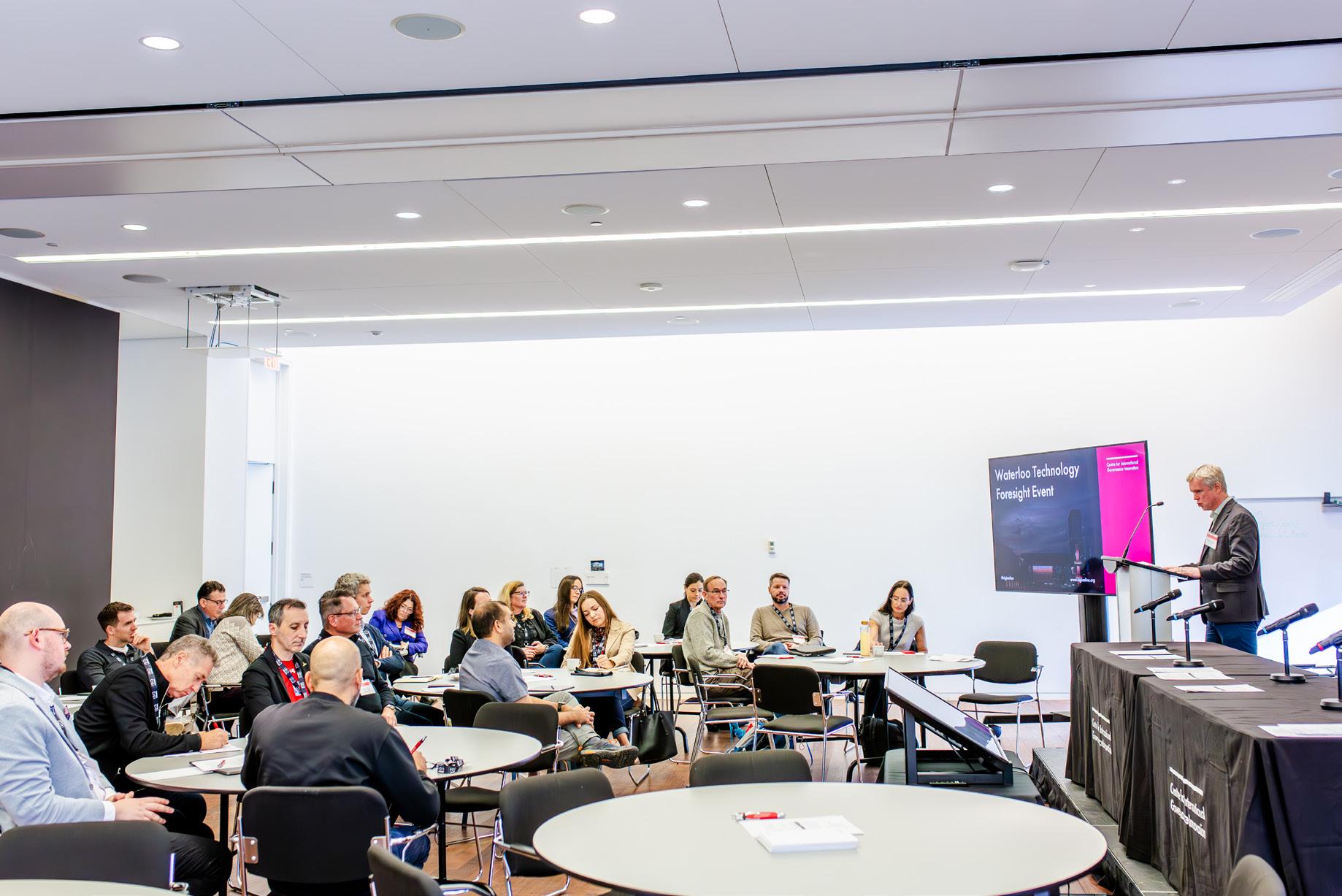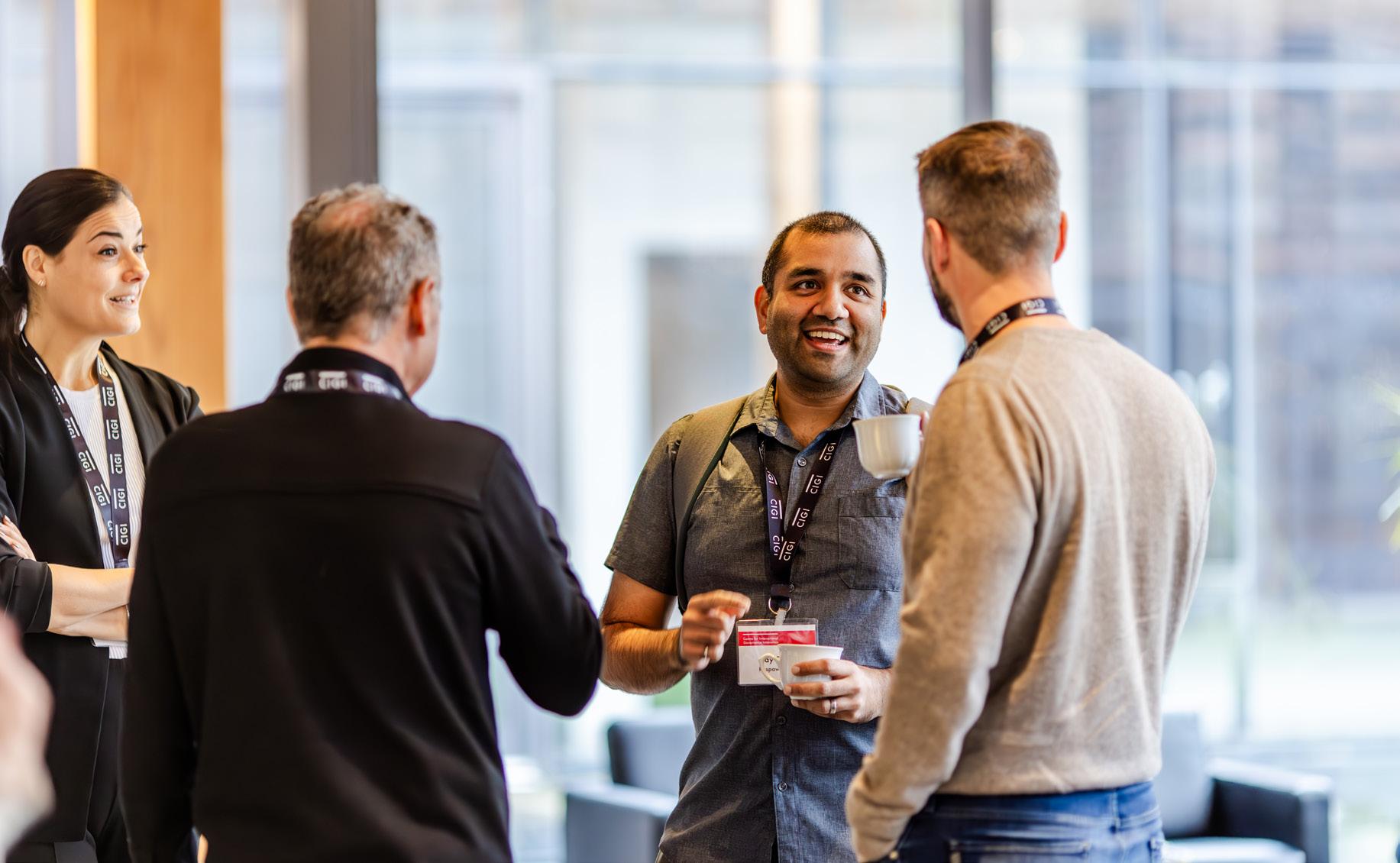Conference Report — Waterloo, Ontario, Canada, November 26, 2024


Conference Report — Waterloo, Ontario, Canada, November 26, 2024

Conference Report — Waterloo, Ontario, Canada, November 26, 2024
The Centre for International Governance Innovation (CIGI) is an independent, non-partisan think tank whose peer-reviewed research and trusted analysis influence policy makers to innovate. Our global network of multidisciplinary researchers and strategic partnerships provide policy solutions for the digital era with one goal: to improve people’s lives everywhere. Headquartered in Waterloo, Canada, CIGI has received support from the Government of Canada, the Government of Ontario and founder Jim Balsillie.
Le Centre pour l’innovation dans la gouvernance internationale (CIGI) est un groupe de réflexion indépendant et non partisan dont les recherches évaluées par des pairs et les analyses fiables incitent les décideurs à innover. Grâce à son réseau mondial de chercheurs pluridisciplinaires et de partenariats stratégiques, le CIGI offre des solutions politiques adaptées à l’ère numérique dans le seul but d’améliorer la vie des gens du monde entier. Le CIGI, dont le siège se trouve à Waterloo, au Canada, bénéficie du soutien du gouvernement du Canada, du gouvernement de l’Ontario et de son fondateur, Jim Balsillie.
Kailee Hilt is a program manager and research associate at CIGI. She focuses on public policy issues tied to emerging technology, privacy and cybersecurity.
Research Director, Transformative Technologies Tracey Forrest
Director, Program Management Dianna English
Program Manager and Research Associate Kailee Hilt
Senior Publications Editor Jennifer Goyder
Graphic Designer Sami Chouhdary
Copyright © 2025 by the Centre for International Governance Innovation
The opinions expressed in this publication are those of the author and do not necessarily reflect the views of the Centre for International Governance Innovation or its Board of Directors.
For publications enquiries, please contact publications@cigionline.org.
The text of this work is licensed under CC BY 4.0. To view a copy of this licence, visit http://creativecommons.org/licenses/by/4.0/.
For reuse or distribution, please include this copyright notice. This work may contain content (including but not limited to graphics, charts and photographs) used or reproduced under licence or with permission from third parties. Permission to reproduce this content must be obtained from third parties directly.
Centre for International Governance Innovation and CIGI are registered trademarks.
67 Erb Street West Waterloo, ON, Canada N2L 6C2 www.cigionline.org
On November 26, 2024, the Centre for International Governance Innovation (CIGI) hosted the Waterloo Technology Foresight Event, a closed-door session that brought together local executives and thinkers from Waterloo Region’s dynamic technology sector. The event, held under the CIGI Rule,1 allowed information to be shared freely while protecting individual attribution. This summary highlights some key points from the conversations.
The event served as an important platform for dialogue, offering insights into how global trends intersect with local business realities and exploring the opportunities and challenges that emerging technologies present. At the heart of the discussions was Canada’s role in an increasingly complex and competitive global landscape, with participants considering the forces shaping the future of innovation and economic growth.
As the conversation turned to the global economic future, participants were presented with three potential trajectories. The first envisioned the continuation of the existing system, while the second forecasted a surge in technological advancements driven by the United States, and the third considered the possibility of emerging markets surpassing developed economies.

1 See www.cigionline.org/about/cigi-rule/.

In this context, India was highlighted as a key potential growth engine, while the United States remained most likely positioned as the largest global economy on most measures. Central to these scenarios was the game-changing role of technology, particularly in artificial intelligence (AI), quantum computing and energy systems. These innovations have the power to dramatically reshape global productivity, competition and the balance of economic power.
The session also expanded on the potential implications of these technological advancements for the global order. Participants considered various scenarios, from the reform of existing global institutions to the rise of alternative systems such as BRICS, or even a fracturing of the world into regional blocs. The growing risk of global disorder, driven by unresolved conflicts and diminishing international cooperation, was underscored as a significant challenge facing policy makers and businesses alike.
One of the primary concerns raised during the event was Canada’s struggle to retain its talent and start-ups in the face of intense competition from more established tech hubs such as Silicon
Valley. Despite Canada’s strong infrastructure and resources, Silicon Valley and other hubs outside Canada continue to attract entrepreneurs and investors due to their more aggressive investment environments and established support systems.
Founders in Canada often encounter obstacles, especially in securing capital and attracting the talent necessary to scale their businesses. The group emphasized the importance of fostering a culture of innovation, one that actively rewards risk taking, reduces bureaucratic hurdles and offers strong incentives for emerging industries, such as AI. Favourable stock options, competitive compensation and targeted subsidies were seen as essential to retaining top talent and ensuring that Canadian startups remain competitive on the global stage.
Another major topic of discussion was the escalating costs of AI leadership. With foundational AI models now approaching a staggering CDN$4 billion in development costs, Canada is finding it increasingly difficult to compete with countries, such as France, that provide more substantial subsidies for such high-cost initiatives.
There was broad support for the idea of subsidizing computing resources and reducing operational costs to attract global AI talent and projects to Canada. Canada’s Scientific Research and Experimental Development tax incentives program also came under scrutiny, with some participants arguing that it is inefficient and misaligned with the needs of innovators, particularly in the start-up space.
Education and cultural shifts also featured prominently in the discussions. Participants pointed out the limitations of the current education system, which they felt is ill-equipped to prepare the next generation of innovators. Traditional education models often fail to inspire the creativity, adaptability and problem-solving skills necessary to navigate today’s fast-paced, technology-driven world. Tools that can democratize access to AI and encourage hands-on learning were explored as promising examples of how education can evolve to better meet the needs of the future workforce. Participants agreed that reforms to promote curiosity, creativity and alignment with industry needs would be key to developing a generation of innovators capable of leading in the digital age.
As the event concluded, there was apparent consensus on the need for Canada to fundamentally rethink its approach to innovation and policy. There was a strong call for leadership through culture, with an emphasis on adopting builderfocused policies that promote grassroots innovation. The participants expressed the view that creating an energetic “vibe” of opportunity and support is essential to attracting entrepreneurs, investors and global talent.
The discussion also highlighted the need for a mindset shift, one that prioritizes risk and adaptability over risk-averse regulation. Reflecting on Canada’s rich history of technological contributions, from the discovery of insulin to cutting-edge AI research, participants acknowledged the country’s potential to be a leader in the next wave of technological transformation. However, they warned that without decisive, bold action, Canada risks losing any remaining competitive edge in the global technology race.
The Waterloo Technology Foresight Event ultimately served not only as a forum for discussing challenges, but also as a rallying call for Canada, as a whole, to create an environment where innovation can thrive. By facilitating an ecosystem that empowers entrepreneurs and innovators, Canada can secure its place as a global leader, shaping the emerging technologies of the future.

November 26, 2024
8:30–9:15 a.m. Breakfast and Networking
9:15–9:45 a.m. The Global Landscape Shaping Canada’s Technology Future
The introductory remarks will outline how changing economic and environmental dynamics, geopolitical tensions and technological advancements are transforming global relations and institutional regimes. It will also offer key insights for policy makers on adapting to the evolving international order.
9:45–10:45 a.m. Panel: Key Priorities for Emerging Technology and Canada
As Canada prepares to take on the G7 presidency in 2025, it faces a central opportunity to shape global conversations around the future of technology. This panel will explore the important priorities Canada must address to build a resilient, inclusive and future-ready technology ecosystem. The discussion will examine potential barriers to Canada’s leadership in emerging technologies, including AI, and how international cooperation can help overcome these challenges.
Discussion Questions:
→ What is the role of government in building a strong ecosystem? How can policy decisions make or break these efforts? What influence, if any, can we (this room, various levels of government, institutions, Canadians writ large) hope to have in shaping how emerging technologies unfold over the coming years?
→ Canada faces significant challenges in attracting and retaining top tech talent. How can we (again, this room, various levels of government, institutions, Canadians writ large) bridge these gaps?
→ How can Canada (again, this room, various levels of government, institutions, Canadians writ large) enhance the education system to both develop tech talent whose skills are aligned with industry needs and create pathways that encourage graduates to build here versus in the United States?
→ What can we (again, this room, various levels of government, institutions, Canadians writ large) do to better support entrepreneurs to build global tech giants here, from our backyard?
10:45–11:00 a.m. Concluding Remarks on Canada’s Role in Technology Governance Leadership
The closing session synthesizes the morning’s discussions, distilling actionable insights on Canada’s future in technology. The session will spotlight key messages, exploring how Canada can harness its strengths to navigate an increasingly complex global tech landscape.
67 Erb Street West Waterloo, ON, Canada N2L 6C2
www.cigionline.org